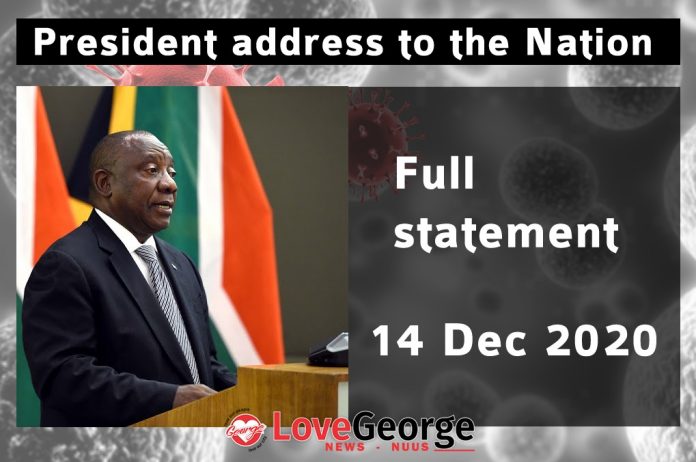STATEMENT BY PRESIDENT CYRIL RAMAPHOSA ON PROGRESS IN THE NATIONAL EFFORT TO CONTAIN THE COVID-19 PANDEMIC, 14 DECEMBER 2020
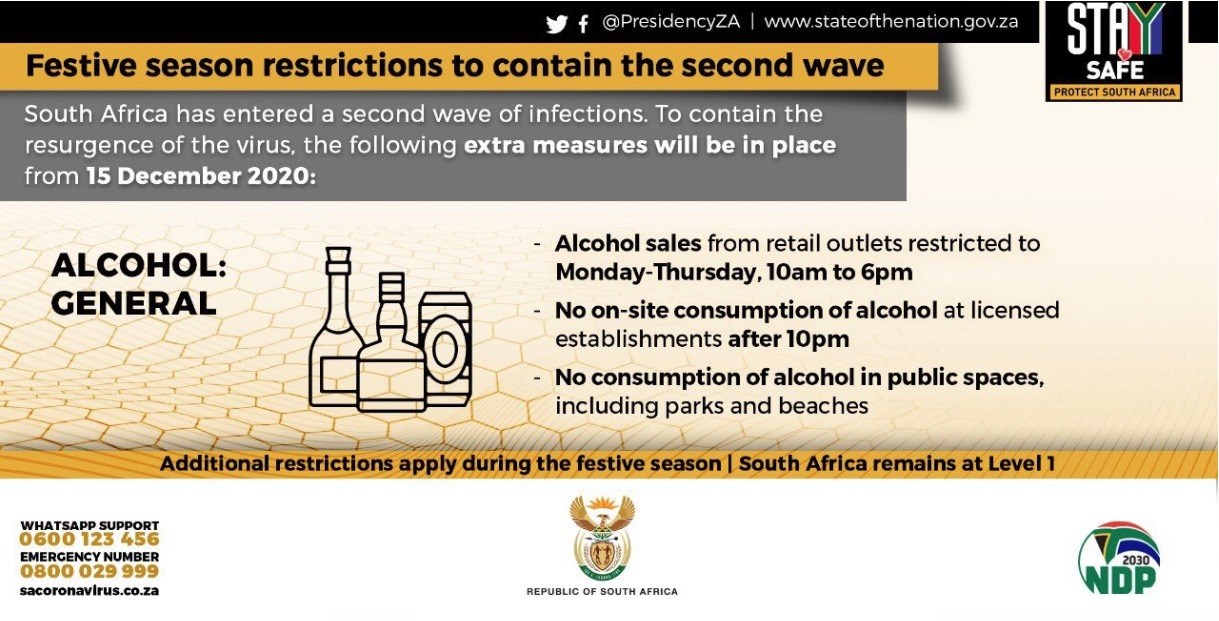
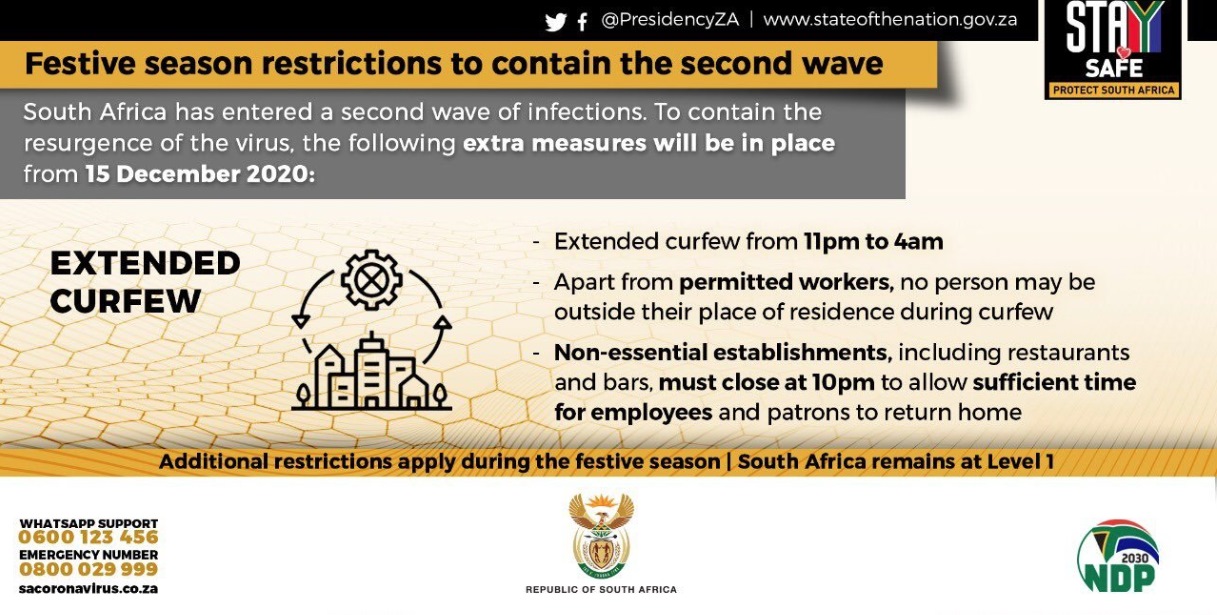
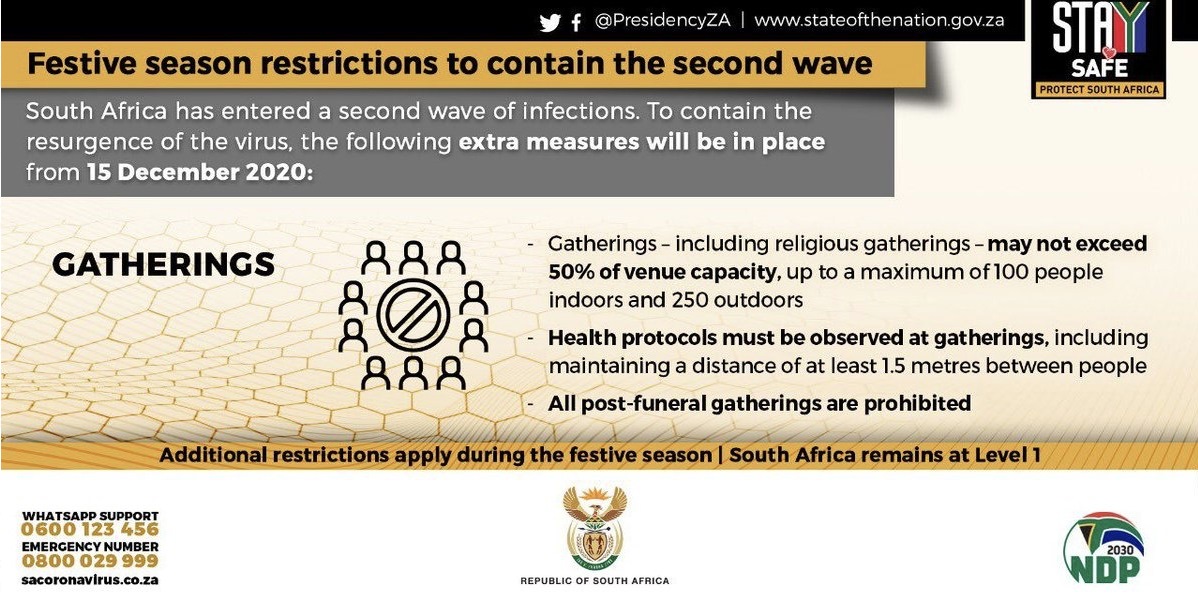
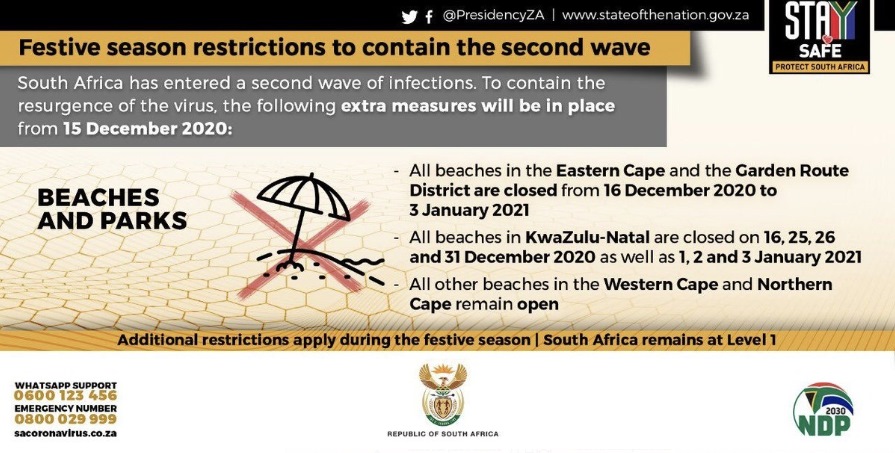
My fellow South Africans,
It is just 11 days since I last addressed you.
Then I reported on the signs of a resurgence of coronavirus infections in various parts of the country.
On that day, the 3rd of December, our country recorded over 4,400 new cases.
Yesterday, the 13th of December, we recorded nearly 8,000 new cases.
The cumulative number of confirmed coronavirus cases in South Africa now stands at 866,127.
These figures are a cause for great concern.
There can no longer be any doubt – the country has entered a second wave of coronavirus infections.
Given the rate at which new cases have grown over the last two weeks, there is every possibility that if we do not act urgently and if we do not act together, the second wave will be more severe than the first wave.
The daily average of new cases nationally over the last 7 days is 74% higher than the previous 7 days.
In this time, the number of new cases has increased from a daily average of around 3,800 to just over 6,600 a day.
The daily average of COVID-19 deaths has increased by nearly 50% over the same period from just over 100 deaths a day to just over 150 deaths.
The four provinces that are leading the second wave are Eastern Cape, Western Cape, KwaZulu-Natal and Gauteng.
For the first time in this pandemic, most of the new infections are among young people, particularly those in the age group of 15 to 19 years.
There are probably many reasons for this massive spike in infections, but some key contributors are now becoming clearer.
Gatherings – especially social gatherings and parties – are the largest source of outbreaks.
In many of these gatherings, social distancing is not being observed, venues are crowded and not adequately ventilated, hand sanitiser is not readily available, and people are not wearing masks.
Many people consume alcoholic drinks at these ‘super-spreader’ events, with the result that people become less careful about taking measures to protect themselves and prevent infection.
The recent post-matric Rage Festival event in Ballito is a harsh reminder of how dangerous large gatherings can be.
We now know that nearly 1,000 young people from Gauteng who attended the event have tested positive for the coronavirus. What we don’t yet know is how many more people each of them has infected.
It is said that up to 300 families could in turn have been infected.
The sad truth about this pandemic is that festivals, concerts and parties – which should be occasions for fun and joy – are proving to be sources of infection and illness, and may even lead to deaths.
Another factor in the rise in infections is increased travel.
Many people do not observe prevention measures as they move within cities, towns and rural areas, and between different areas.
We have to recognise that the more we travel, the greater the potential for the spread of the virus.
That means wearing a mask when you are in public transport and making sure that the windows are open at all times.
It also means reducing the number of people that you spend time with if you are travelling to visit family and friends in other parts of the country.
It is safer to socialise with your immediate family than with large gatherings that could cause the virus to spread.
More broadly, the massive rise in infections is the result of people not observing basic – and easy to follow – practices.
These measures are particularly important as transmission is often caused by people who are infected but are not yet showing symptoms, if they develop symptoms at all, and may not even know they have the virus.
The relatively low rates of infection over the last few months have made us more relaxed about wearing a mask over our nose and mouth every time we go out in public.
We no longer see the point of avoiding crowded venues, or standing more than 1.5 metres from each other, or keeping windows open when travelling on public transport or sanitising commonly used places.
We have gotten into the Christmas spirit early and are inviting friends and family over for get-togethers.
Yet, it is our failure to closely adhere to all these basic precautions at all times that has brought us to this second wave.
These safety precautions may not seem important until someone you love has been infected with the virus because of your own carelessness.
The festive season now poses the greatest threat to the health and well-being of our nation.
It poses the greatest threat also to the recovery of our economy.
This is because the festive season is traditionally a time of gatherings, of travel, of meeting friends and family, and of relaxing after a difficult and stressful year.
In these respects, the festive season is very much like the Easter period.
It is worth remembering that during Easter this year, we were able to limit the number of infections because we all remained disciplined, we all observed the restrictions and we all adhered to the basic health measures.
In this regard, we recognise the sacrifices that churches made by suspending Easter services, and indeed the contribution that all faiths have made throughout the year to preserving life.
Just as we did during Easter, we need to once again adhere to the basic health protocols.
If we do not do things differently this festive season, we will greet the new year not with joy, but with sorrow.
Many of our friends, relatives and co-workers will be infected, some will get severely ill and some, tragically, will die.
Unless we do things differently, this will be the last Christmas for many, many South Africans.
This is certainly what we don’t want. We all want to live and let our loved ones live.
It is therefore essential that we take extraordinary measures to contain the second wave and save lives, while working to protect livelihoods.
My fellow South Africans,
Eleven days ago, we declared Nelson Mandela Bay to be a coronavirus ‘hotspot’ areas, in line with our differentiated approach to the management of the pandemic.
There are other municipalities that have also shown a particularly sharp rise in infections.
The Minister of Health Dr Zwelini Mkhize has visited these areas and after consultations with various stakeholders, Cabinet has decided to also declare the following two districts as coronavirus hotspots.
These are the:
– Sarah Baartman District
– Garden Route District
This all means that the same additional restrictions that we applied to Nelson Mandela Bay will apply in these districts from midnight tonight and will continue until we see a clear and sustained decline in infections.
While these hotspot areas require particular attention, the festive season poses significant risks for the entire country.
We have therefore been undertaking consultations in provinces, including at municipal level, on the measures that need to be taken to contain the second wave.
There have been extensive deliberations within the National Coronavirus Command Council and the President’s Coordinating Council, which brings representatives of national, provincial and local government together.
Based on the recommendations from these meetings, Cabinet has decided that further restrictions need to be imposed nation-wide from midnight tonight.
Firstly, we will ensure that there is stricter enforcement of existing alert level 1 restrictions throughout the country during the festive season and beyond.
This includes the requirement that drivers and operators of any form of public transport must ensure that all passengers wear a mask.
The managers or owners of buildings, places or premises – including retail stores, shopping centres, and government buildings – are obliged by law to ensure that all customers who enter their facilities or buildings wear a mask.
An employer must ensure that all employees wear a mask while they perform their duties.
This places a responsibility on all owners, managers and employers – and on all of us – to ensure that South Africans are safe whenever they are in any of these places.
The responsible individuals who do not ensure compliance with the regulations by their passengers, customers or employees will be liable to a fine or to imprisonment of up to six months.
Secondly, we are taking measures to reduce the risk of super-spreading events.
The current restrictions on the size of gatherings do not do enough to prevent crowding in the current situation where new cases are rising rapidly.
Therefore, gatherings – including religious gatherings – may not be attended by more than 100 people for indoor events and 250 for outdoor events.
At all times, and particularly in smaller venues, the total number of people in a venue may not exceed more than 50% of the capacity of the venue.
All gatherings must include adequate ventilation, social distancing, wearing of masks and provision of hand-sanitiser.
Due to the potential for transmission, all post-funeral gatherings, including ‘after-tears’ parties, are prohibited.
One of the greatest challenges we need to confront are the huge crowds that flock to beaches and recreational parks on public holidays over the festive season.
We have undertaken extensive consultations on this issue so that we can find an approach that reduces the risk of large-scale transmission while limiting the negative impact on businesses in coastal areas.
We have therefore agreed to adopt a differentiated approach, which takes into account the different circumstances in different areas of the country.
In the areas with the highest rate of infection, beaches and public parks will be closed for the duration of the festive season from the 16th of December to the 3rd of January.
This will apply to all of the Eastern Cape, as well as to the Garden Route district in the Western Cape.
In KwaZulu-Natal, beaches and public parks will be closed on what are traditionally the busiest days of the season.
These days are the 16th, 25th, 26th and 31st of December 2020 and the 1st, 2nd and 3rd of January 2021.
The beaches and public parks of the Northern Cape and the Western Cape – with the exception of the Garden Route – will remain open to the public over the festive season.
Festivals, live music, and live performances at beaches are prohibited.
Beaches and parks that are open to the public will only be open between 9am and 6pm.
The situation will be monitored daily by local authorities to ensure compliance with the regulations on gatherings and the prohibition of alcohol.
In instances, where there are large crowds or poor compliance with safety measures, specific beaches and recreational parks will be closed.
National and provincial parks and other parks where access control measures and entry limitations are already in place may remain open to the public.
This is a most trying situation, which requires constant attention.
I have directed that all members of the National Coronavirus Command Council and key personnel should be on standby to ensure constant monitoring and assessment of the situation countrywide.
Should the situation deteriorate, further action will be taken to protect our people.
The third area of focus over this period is to prevent super-spreader events and reduce the burden on health care services due to irresponsible alcohol consumption.
Therefore, the following measures will be implemented:
The hours of the curfew will be longer, starting at 11pm and ending at 4am.
Non-essential establishments, including restaurants and bars, will have to close at 10pm so that staff and patrons can get home before the enforcement of the curfew.
The curfew is meant to prevent gatherings that go on late into the night, while enabling restaurants, bars and taverns to continue to operate and earn an income.
We should all remember that the hours of curfew also apply to Christmas Eve and New Year’s Eve. This means that we will all need to make changes to the way in which we celebrate these occasions.
The sale of alcohol from retail outlets will only be permitted between 10am and 6pm from Monday to Thursday.
Registered wineries and wine farms may continue to offer tastings and wine sales to the public for off-site consumption over weekends. This exception is being made due to the vital contribution of these establishments to the tourism sector in several parts of the country.
Alcohol consumption in all public spaces, such as beaches and parks, is strictly forbidden.
We will not allow large numbers of people congregating in any one place without proper controls or protocols in place.
These festive season restrictions will be reviewed in early January based on the state of the pandemic across the country.
My fellow South Africans,
In determining our response to the second wave of infections, we have sought to carefully balance the need to save lives and to protect livelihoods.
The national lockdown which we imposed at the beginning of the epidemic was designed to delay the spread of the virus so that we could adequately prepare our health system to respond to the rise of infections.
At that time, we were not ready to cope with a sudden increase of cases and hospital admissions.
We needed to secure adequate equipment and supplies, to make additional space available in our health facilities, to train our healthcare workers and to put in place systems to monitor and respond to trends in the epidemic.
A full lockdown was absolutely necessary to delay the epidemic but would not serve the same purpose now.
Over the past several months, we have put in place a range of measures to enhance our capacity to respond.
Through the hard work of our healthcare workers, public servants, medical experts and scientific advisors, we have marshalled all of our resources to protect the people of South Africa and provide care to those who need it.
The measures that we took early in the epidemic, and the actions of every South African, have allowed us to save many lives already.
Now, we must protect the gains we have made and work together to contain the second wave.
As we have done since the very beginning, we must act based on the best scientific evidence that is available to us.
Just as our doctors, nurses and frontline workers are working tirelessly to protect us, we must work tirelessly to protect them.
To date, over 38,000 health workers in the public sector have tested positive for coronavirus. Of these, nearly 5,000 were admitted to hospital.
Sadly, 391 health workers in the public sector have passed away.
As a nation, we owe so much to these brave and dedicated people and to their families, for without them, we would not have come this far.
As we confront the second wave of infections, we must do everything we can to support and protect our health workers.
Unless we act responsibly now, unless we adhere at all times to the basic precautions that we all know, we will face a bleak new year.
Despite the restrictions on many of our regular activities, this season can be both festive and safe.
This festive season, I am asking you to keep your celebrations small and to avoid crowds.
If you are spending time with other people, I am asking you to do so outside, enjoying the splendid South African summer weather, or at least to make sure that you are in a well-ventilated space.
I am asking you to wear a mask that covers your nose and mouth whenever in public, or in the company of people you don’t live with.
There is no point wearing a mask on your chin, keeping it in your pocket or lowering it to speak to someone.
Remember to regularly wash your hands with soap and water for at least 20 seconds or with sanitiser.
Limit your travel as much as possible. And if you have to travel, make sure that you travel safely.
If you are going to visit friends and family, limit your number of contacts for at least one week before you travel and try to spend time with only your immediate family or as small a group of people as possible.
We know that COVID-19 affects people differently.
According to the World Health Organization, most people are likely to develop mild or moderate illness and will recover without hospitalisation.
The most common symptoms are fever, dry cough, and tiredness. Less common, but moderate, symptoms are aches and pains, sore throat, and a loss of taste or smell.
If you experience these symptoms, then you should isolate yourself from others.
If you experience severe symptoms, such as difficulty breathing or shortness of breath, chest pain, loss of speech or movement, you should seek immediate medical attention.
Please remember that if you have tested positive for coronavirus or if you have been in close contact with someone who has tested positive, you should immediately isolate yourself from others.
As we have said in the past the only viable defence we will have against Covid-19 will be the vaccine.
South Africa has concluded all the necessary processes to ensure its participation in the World Health Organization’s COVID-19 Global Vaccine Access Facility.
This facility – known as COVAX – pools resources and shares vaccine development risk to ensure equitable access to vaccines when they become available.
As part of this facility, it is expected that South Africa will receive initial vaccines to cover 10% of our population in the early part of next year.
We are also part of the African Vaccine Acquisition Task Team that is looking at alternative financing mechanisms to secure additional vaccines for African countries beyond COVAX.
The Minister of Health is part of this Task Team and is also looking at innovative partnerships with the private sector to ensure that South Africans have access to an effective vaccine that is suitable to our conditions.
The next few weeks are going to be a great test of our determination and restraint.
This period will require each of us to do things differently to previous years because this year is unlike any other we have lived through before.
It will require us to give up some short-lived pleasures to protect ourselves and others, and to ensure that we can enjoy such times together in future years.
I am convinced that if we each play our part, if we each follow the few basic precautions, then we can all have a joyful festive season – and, most importantly, we can all have a happy, healthy and prosperous new year.
I wish you all a blessed festive season, that you may remain safe and in good health, and that we may welcome in the new year as one united and resolute nation.
May God Bless South Africa and protect her people.
I thank you.
ISSUED BY THE PRESIDENCY OF THE REPUBLIC OF SOUTH AFRICA

